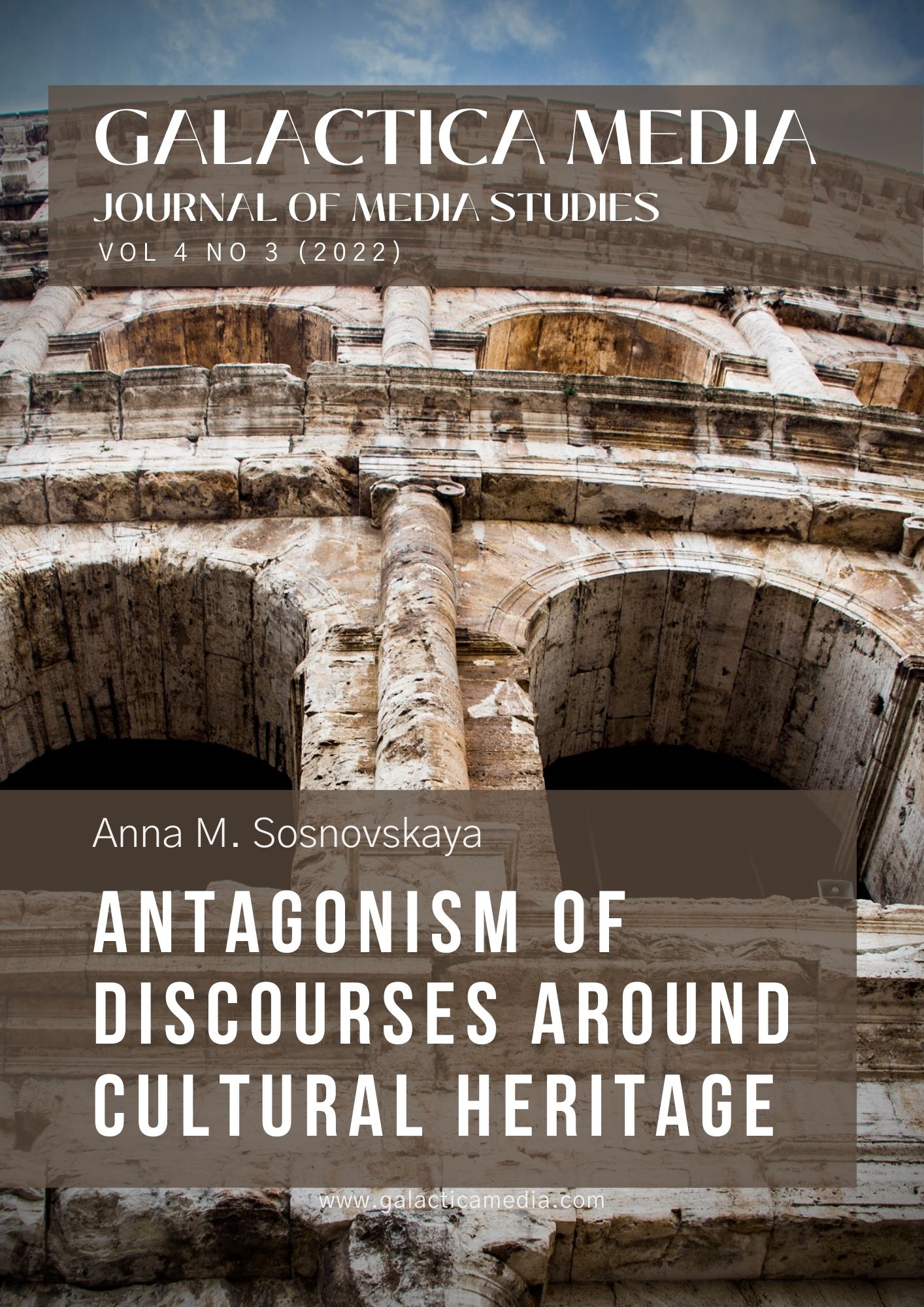Abstract
The article provides a discourse-analysis of the contemporary conflict over the preservation of Historic Centre of Saint Petersburg and Related Groups of Monuments. The main participants in this conflict are 10 interest groups, which are reassembled each time in the process of articulating the discourse of their group. These actors are: UNESCO, local and federal governments, businesses, urban conservationists, residents and existing physical heritage. The article considers the dispositive of discourses that supports group formation and group identity. The results found are presented visually and graphically. From the media and social networks, the case of the destruction of the heritage is reconstructed and the discourse of city defenders is considered. The conflict of discourses and new types of antagonisms associated with different ones are reconstructed: the regime of affects, the visualization of the city, the development of the objective environment, the instruments of social action, and representation in the media and social networks. The article is intended for those interested in discursive analysis, actor-network theory, affect theory, world heritage, visualization of space, media, identity, and urbanism.
References
Bateson, G. (2000). Steps to an Ecology of Mind: Collected Essays in Anthropology, Psychiatry, Evolution, and Epistemology. Smysl. (In Russian).
Bateson, G. (2002). Mind and nature: A necessary unity. Hampton Press.
Carpentier, N. (2017). The discursive-material knot: Cyprus in conflict and community media participation. Peter Lang. https://doi.org/10.3726/978-1-4331-3754-9
Foucault, M. (1996). Willingness to Knowledge. In The Will to Truth: Beyond Knowledge, Power, and Sexuality (сс. 97–268). Magisterium-Castal. (In Russian).
Foucault, M. (2004). The Archaeology of Knowledge. Humanitarian Academy Research Center; University Book. (In Russian).
Foucault, M. (2005). The Need to Protect Society: A Course of Lectures given at the Collège de France, 1975-1976. Nauka. (In Russian).
Goffman, E. (1974). Frame analysis: An essay on the organization of experience (pp. ix, 586). Harvard University Press.
Harman, G. (2021). Object-Oriented Ontology: A New Theory of Everything. Ad Marginem. (In Russian).
Hochschild, A. R. (2010). The managed heart: Commercialization of human feeling. In J. O’Brien (Ed.), The Production of Reality: Essays and Readings on Social Interaction (pp. 320–336). Sage.
Jabareen, Y., & Eizenberg, E. (2021). Theorizing urban social spaces and their interrelations: New perspectives on urban sociology, politics, and planning. Planning Theory, 20(3), 211–230. https://doi.org/10.1177/1473095220976942
Jameson, F., Fish, S., & Massumi, B. (2002). Parables for the Virtual: Movement, Affect, Sensation. Duke University Press.
Lacan, J. (2010). Anxiety (Seminar, Book X (1962/63)). Gnosis, Logos. (In Russian).
Laclau, E., & Mouffe, C. (2014). Hegemony and socialist strategy: Towards a radical democratic politics (Vol. 8). Verso Books.
Latour, B. (2022). Reassembling the social: an introduction to actor-network-theory. Litres. (In Russian).
Law, J. (2015). After method: mess in social science research. Gaidar Institute Publishers. (In Russian).
Lewin, K. (2000). Field theory in social science. Rech. (In Russian).
Sementsov, S. V. (2012). St. Petersburg Historic Agglomeration – a World Scale Urban Planning Object. VolgGASU Internet bulletin, 1, 49. (In Russian).
Sosnovskaya, A. (2021). Conceptualization of a UNESCO World Heritage Site: Generation Z Visual Representation of St. Petersburg. SSRN Electronic Journal. https://doi.org/10.2139/ssrn.3994923 (In Russian).
Sosnovskaya, A. S. (2022). Heritage Preservation Under Sustainable Development and Community Inclusion: Semiotic and Discursive Mapping of Saint Petersburg. International Journal of Architecture and Planning, 2(1), 33–36. https://doi.org/10.51483/IJARP.2.1.2022.33-36
Volodina, A. V. (2019). Deleuzian Theory of Affect: Aesthetic Problems. Culture and Art, 12, 35–45. https://doi.org/10.7256/2454-0625.2019.12.31729 (In Russian).
Yeremicheva, G. V. (Ed.). (2018). The social space of the city. Sociological Institute of the Russian Academy of Sciences. https://doi.org/10.19181/monograph.2019.4 (In Russian).

This work is licensed under a Creative Commons Attribution 4.0 International License.

